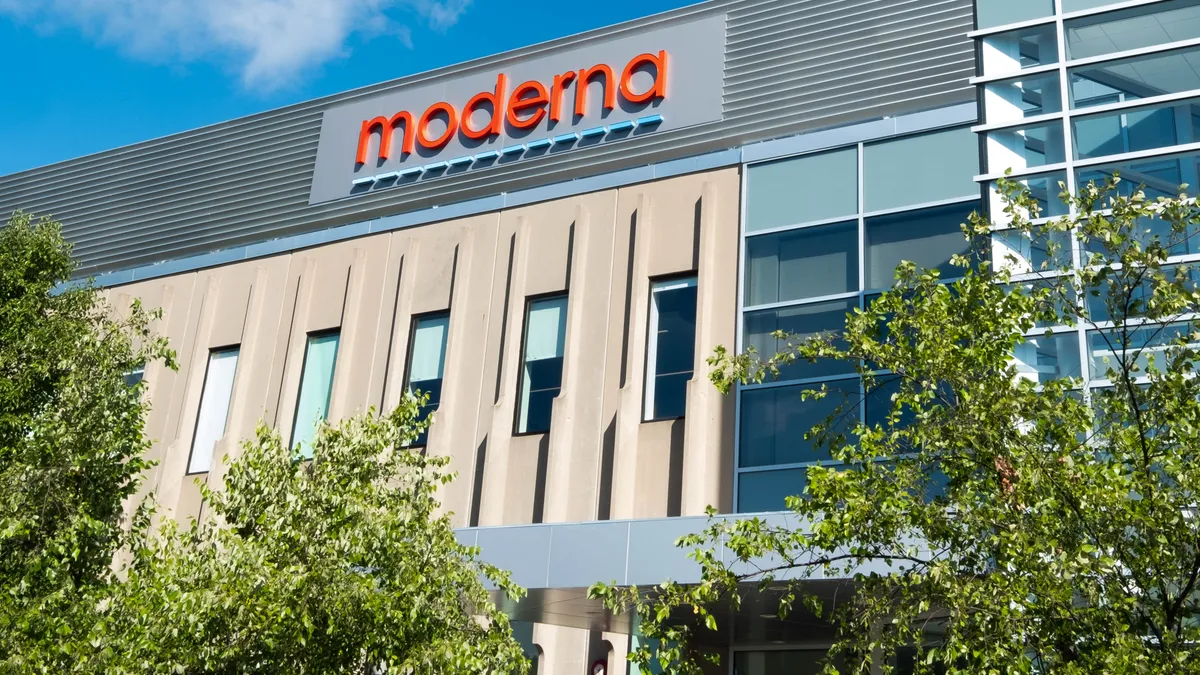Dive Brief:
- Moderna's COVID-19 vaccine is expected to stay stable at 2-8 degrees Celsius, the temperature of a standard refrigerator, for up to 30 days, the company announced Monday. Moderna had previously estimated the vaccine would remain stable for seven days, but the longer time-frame and common temperature requirement means existing cold chain and logistics infrastructure can handle the distribution.
- Moderna released the new findings on the vaccine's storage the same day that it announced the inoculation was found to be 94.5% effective at preventing COVID-19 compared to a placebo. And it comes exactly one week after Pfizer released results from its vaccine study showing it was 90% effective. Moderna's vaccine can also be stored long term at minus 20 degrees Celsius, the temperature of a standard freezer, for six months. It can then be at room temperature for 12 hours after being removed from refrigeration for vaccination.
- The company is planning to make 20 million doses of its vaccine ready to ship in the U.S. by the end of the year and 500 million to 1 billion doses next year, Moderna CEO Stéphane Bancel said last week.
Dive Insight:
"From a distribution standpoint, we're ready," Moderna Chief Medical Officer Tal Zaks said on the company's earnings call last month.
Moderna and Pfizer's coronavirus vaccine candidates have both seen success in initial studies, but the varying cold chain requirements between the two have led some to suggest that the Moderna vaccine could have a leg up when it comes to distribution.
"We expect that [the vaccine will] be distributed within existing infrastructure," Zaks said. "There is nothing new required that hasn't already been used for years with many other vaccines."
Pfizer and BioNTech's vaccine must be kept at minus 70 to 80 degrees Celsius, requiring dry ice to maintain. But 2-8 degrees Celsius can be maintained with special packaging 96 hours outside of a refrigerator, according to logistics experts. This led one federal immunization panel to suggest the temperature requirements for Pfizer and BioNTech's vaccine could limit its distribution.
"That's going to pose some very real infrastructure challenges," Stephen Meyer, a senior director analyst in Gartner's supply chain group, said in an interview, referring to the vaccine cold storage requirements generally. "There are going to be certain areas of the world that don't have the capability to store that."
Juan Andres, chief technical operations and quality officer at Moderna, said in a statement that the temperature requirements for its vaccine allow for "simpler distribution" since it can be stored in a normal refrigerator.
Another difference between Pfizer and Moderna is the company's distribution plans. Pfizer has opted to bypass McKesson, the company chosen to distribute the vaccine by the U.S. government as part of Operation Warp Speed. Moderna, meanwhile, will be relying on McKesson for distribution, it confirmed in the announcement. This leaves Moderna to focus on manufacturing the vaccine and filling vials.
"Ultra frozen vaccines, which are those requiring temperatures of minus 60 degree Celsius or colder are not within the scope of McKesson's contract with the CDC," McKesson CEO Brian Tyler said on the company's earnings call early this month.
Tyler added that McKesson will not play any role in deciding where the vaccines will be distributed, but said it would be following the direction of the U.S. government on those decisions.
"We quickly ramped up our capacity outfitting and staffing four distribution center locations for assembling and storing the ancillary kits to be used in the administration of the COVID-19 vaccines once approved," Tyler said. "Each kit contains enough supplies to be used for the administration of 100 plus vaccines."
Moderna's Bancel spoke about the cold chain differences at an analyst conference last week where he said the temperature requirements for its vaccine are the same as insulin.
"So of course, there's a lot of capacity for a product like that both into a GP's office, pharmacies and so on," Bancel said, adding that McKesson already has logistical capabilities to carry something at minus 20 degrees Celsius.
Moderna's vaccine does not require dilution at the final vaccination location, which the company says gives it another logistical leg up as it requires fewer resources to administer.
"For other products, you need a dilution on site, which is an extra step when we need to go through this massive vaccination, which is a big logistical challenge," Bancel said.














